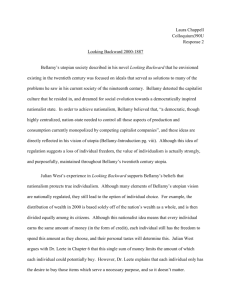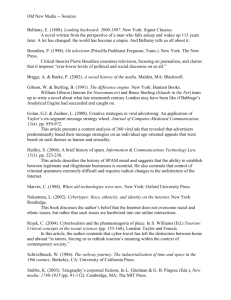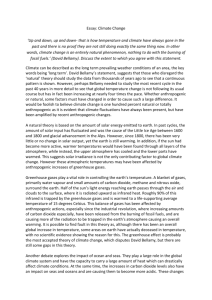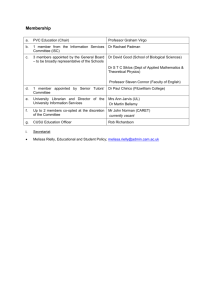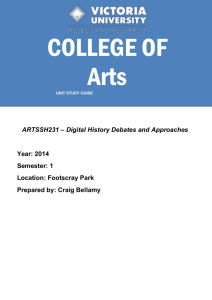Tunnel Vision in Bellamy's Utopia: Looking Backward through the
advertisement
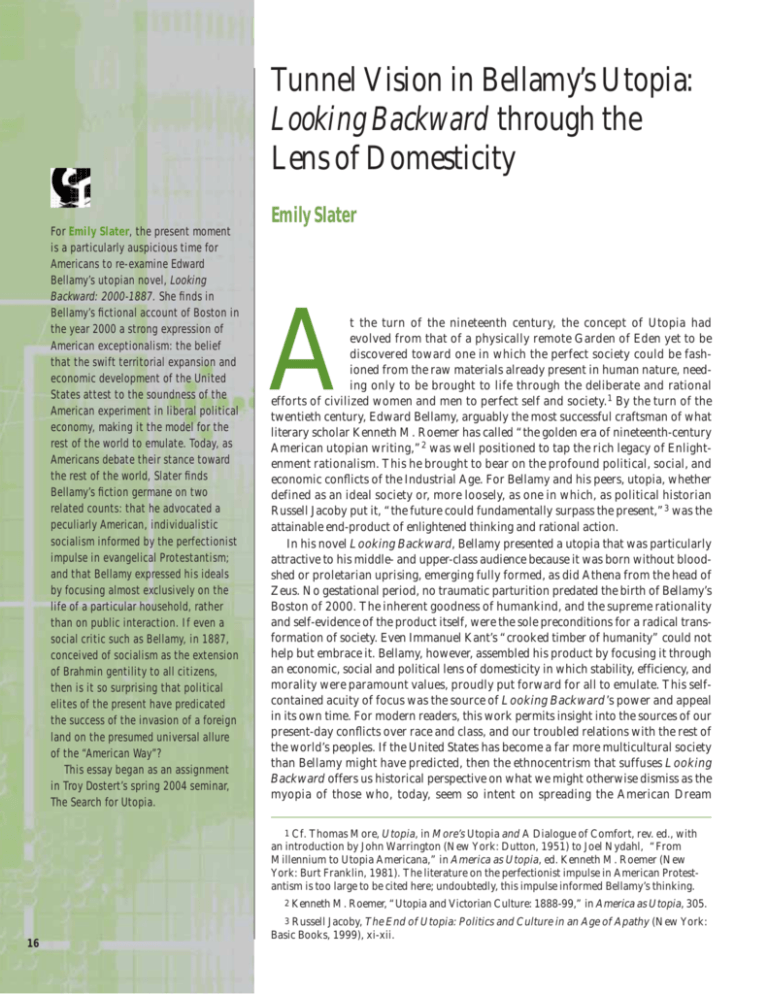
Tunnel Vision in Bellamy’s Utopia: Looking Backward through the Lens of Domesticity For Emily Slater, the present moment is a particularly auspicious time for Americans to re-examine Edward Bellamy’s utopian novel, Looking Backward: 2000-1887. She finds in Bellamy’s fictional account of Boston in the year 2000 a strong expression of American exceptionalism: the belief that the swift territorial expansion and economic development of the United States attest to the soundness of the American experiment in liberal political economy, making it the model for the rest of the world to emulate. Today, as Americans debate their stance toward the rest of the world, Slater finds Bellamy’s fiction germane on two related counts: that he advocated a peculiarly American, individualistic socialism informed by the perfectionist impulse in evangelical Protestantism; and that Bellamy expressed his ideals by focusing almost exclusively on the life of a particular household, rather than on public interaction. If even a social critic such as Bellamy, in 1887, conceived of socialism as the extension of Brahmin gentility to all citizens, then is it so surprising that political elites of the present have predicated the success of the invasion of a foreign land on the presumed universal allure of the “American Way”? This essay began as an assignment in Troy Dostert’s spring 2004 seminar, The Search for Utopia. Emily Slater A t the turn of the nineteenth century, the concept of Utopia had evolved from that of a physically remote Garden of Eden yet to be discovered toward one in which the perfect society could be fashioned from the raw materials already present in human nature, needing only to be brought to life through the deliberate and rational efforts of civilized women and men to perfect self and society.1 By the turn of the twentieth century, Edward Bellamy, arguably the most successful craftsman of what literary scholar Kenneth M. Roemer has called “the golden era of nineteenth-century American utopian writing,”2 was well positioned to tap the rich legacy of Enlightenment rationalism. This he brought to bear on the profound political, social, and economic conflicts of the Industrial Age. For Bellamy and his peers, utopia, whether defined as an ideal society or, more loosely, as one in which, as political historian Russell Jacoby put it, “the future could fundamentally surpass the present,”3 was the attainable end-product of enlightened thinking and rational action. In his novel Looking Backward, Bellamy presented a utopia that was particularly attractive to his middle- and upper-class audience because it was born without bloodshed or proletarian uprising, emerging fully formed, as did Athena from the head of Zeus. No gestational period, no traumatic parturition predated the birth of Bellamy’s Boston of 2000. The inherent goodness of humankind, and the supreme rationality and self-evidence of the product itself, were the sole preconditions for a radical transformation of society. Even Immanuel Kant’s “crooked timber of humanity” could not help but embrace it. Bellamy, however, assembled his product by focusing it through an economic, social and political lens of domesticity in which stability, efficiency, and morality were paramount values, proudly put forward for all to emulate. This selfcontained acuity of focus was the source of Looking Backward ’s power and appeal in its own time. For modern readers, this work permits insight into the sources of our present-day conflicts over race and class, and our troubled relations with the rest of the world’s peoples. If the United States has become a far more multicultural society than Bellamy might have predicted, then the ethnocentrism that suffuses Looking Backward offers us historical perspective on what we might otherwise dismiss as the myopia of those who, today, seem so intent on spreading the American Dream 1 Cf. Thomas More, Utopia, in More’s Utopia and A Dialogue of Comfort, rev. ed., with an introduction by John Warrington (New York: Dutton, 1951) to Joel Nydahl, “From Millennium to Utopia Americana,” in America as Utopia, ed. Kenneth M. Roemer (New York: Burt Franklin, 1981). The literature on the perfectionist impulse in American Protestantism is too large to be cited here; undoubtedly, this impulse informed Bellamy’s thinking. 2 Kenneth M. Roemer, “Utopia and Victorian Culture: 1888-99,” in America as Utopia, 305. 16 3 Russell Jacoby, The End of Utopia: Politics and Culture in an Age of Apathy (New York: Basic Books, 1999), xi-xii. abroad and “traditional values”— what policy analyst Stephanie Coontz calls “the way we never were” — at home.4 The adjective domestic carries three possible meanings. It may refer to issues centered on the family or household; the condition of being tamed or “housebroken”; or a nation’s internal affairs. Bellamy’s utopia exemplifies all three senses of the word. The character of the Boston of the future emerges exclusively from the insular pens and on the homebound pad of the members of the Leete family, protagonist Julian West’s hosts and guides as he awakens in, and acclimates to, a radically different twentieth-century society. This narrow focus on the domestic serves two purposes. First, a sentimental, home-based narrative made Bellamy’s utopia appealing and accessible to his middle- and upper-class audience without risking offense to their very American palate with unprocessed, European socialism.5 Second, it comfortably bridged the gap between rejection of what political historian Wilfred M. McClay has called the “perniciousness of American individualism” and acceptance of “the supra-personal or collective.”6 In Bellamy’s utopia, isolationism begins, literally, at home. It is impossible to read Looking Backward without being struck by the conflict between the author’s emphasis on the value of social interactions and the absolute lack of dialogue among characters other than West and the Leetes. Within the Leete household, West’s unexpected arrival in the twentieth century is the sole trigger for meaningful interaction or discourse. Bellamy’s silence on community life beyond the Leete family proves even more profound. Dr. Leete comments upon the “splendor of our public and common life as compared with the sim- plicity of our private and home life,” and Edith describes the folly of allowing “the weather to have any effect on the social movements of the people.”7 Nevertheless, Bellamy’s only references to public social encounters in the novel are to a sales clerk, a stream of people pouring into the dining facility, and the waiter whom West immediately depersonalizes by classifying him as a member of the industrial army. Bellamy portrays no chance encounters on the streets, and no enjoyment of group dining. Technology brings music, as well as religion, to its audience in the home rather than through public performance. As historian Merritt Abrash points out, the only scenes in the novel that include more than five people are those set in the teeming, hellish, nineteenth-century Boston to which West returns in a nightmare.8 The value that this society places upon self-containment (alongside intense pride in the “intelligent orchestration of human effort in large-scale combination”9) may seem paradoxical when held up against Leete’s favorite metaphor of the advantages of Nationalism’s “umbrella over all the heads” instead of “three hundred thousand umbrellas over as many heads.”10 The paradox vanishes, however, if we remind ourselves that Bellamy’s utopia represents not the leveling of classes by a rebellious proletariat, but rather, the uplift of the poor through the application of reason. After Bellamy’s quiet revolution, all worthy citizens enjoy the bourgeois lifeway of nineteenth-century America. Had Bellamy presented a grittier transformation, many in his audience likely would not have found his portrait of “Marxism Americanized” so inviting.11 The inhabitants of Bellamy’s utopia are genteel — domesticated — and the structure of The ethnocentrism that suffuses Looking Backward offers us historical perspective on what we might otherwise dismiss as the myopia of those who, today, seem so intent on spreading the American Dream abroad and “traditional values” — what policy analyst Stephanie Coontz calls “the way we never were” — at home. Bellamy’s utopia represents not the 4 Stephanie Coontz, The Way We Never Were: American Families and the Nostalgia Trap (New York: Basic Books, 1992). leveling of classes by 5 Kenneth M. Roemer, “The Literary Domestication of Utopia: There’s No Looking Backward without Uncle Tom and Uncle True,” American Transcendental Quarterly 3, no. 1 (1989): 101; Merritt Abrash, “Looking Backward: Marxism Americanized,” Extrapolation 30, no. 3 (Fall 1989): 237. The activism of Eugene V. Debs exemplified Abrash’s Americanized Marxism. See, for example, Nick Salvatore, Eugene V. Debs: Citizen and Socialist (Urbana: Univ. of Illinois Press, 1982). a rebellious proletariat, 6 Wilfred M. McClay, “Edward Bellamy and the Politics of Meaning,” American Scholar 64, no. 2 (Spring 1995): pars. [7, 20]; [article online]; available from http://search.epnet.com/direct.asp?an= 9504032649&db=afh; Internet; accessed 1 August 2004. but rather, the uplift of the poor through the application of reason. 7 Edward Bellamy, Looking Backward, 2000-1887, ed. Alexander MacDonald (Peterborough, Ontario: Broadview Press, 2003), 137, 134. 8 Abrash, “Marxism Americanized,” 239. 9 McClay, “Bellamy and the Politics of Meaning,” par. [3]. 10 Bellamy, Looking Backward, 134. 11 Abrash, “Marxism Americanized,” 237. 17 their society facilitates their continued tameness. Literary scholar Thomas Peyser likens Bellamy’s view of society to that of the New Urbanism described by sociologist Peter Katz.12 New Urbanists assert “the importance of public over private values,” while Bellamy’s society aims to fashion “ a streamlined and frictionless kind of human being, one who could not possibly offend the neighbors — or be meaningfully distinguished from them.”13 The Bostonians of Looking Backward, however, are not kept “streamlined and frictionless” by external coercion. Bellamy’s admiration of, and “lifelong passion for, the Prussian army” produces not a solidarity-enforcing machine but, instead, a collaborative community in which the “martial virtues of unselfish valor could now be expressed in the ordinary labors of the ordinary civilian.” 14 Bellamy’s utopians are self-domesticated: scales have fallen from their eyes, allowing simple reason, conviction of righteousness, and an intrinsic passion for equality and humanity to triumph over greed and all other “coarser motives.”15 This shared recognition minimizes the potential for conflict and dissent in Bellamy’s society. The conduits for such disruptions, should they occur, are few. The people are the sole judges of the merit of art; “the newspaper press is organized so as to be a more perfect expression of public opinion than it possibly could be . . . when private capital controlled and managed it.”16 Those individuals who decide they “ought to have a newspaper reflecting our opinions” need merely direct a portion of their annual credit toward its publication, choose its editor, and simply “remove him when unsatisfactory.”17 Although freedom of expression is not restricted in Bellamy’s society, it is difficult to imagine how or why disharmony could take root in an intellectual and social environment in which what Peyser terms the “traditional American ambivalence” toward community has been over- come so successfully.18 Within this environment, however, it is not difficult to appreciate how a story such as Edith Leete’s favorite, “Penthesilia,” filled with “love galore,” but devoid of all conflict or dramatic tension, would eclipse the works of Shakespeare, John Steinbeck, or West’s favorite, Charles Dickens—but Bellamy portrays the eclipse as a triumph of the human spirit over the base passions.19 The taming of Bellamy’s society is initiated by the recognition and incorporation of self-evident truths about equality and fraternity. It is maintained because the process of social change prevents any “bubbling up,” cultural or social, from the proletarian masses of the old order. Significantly, in Equality, the sequel to Looking Backward, Bellamy refers to the immigrants who seemed to threaten the Anglo-Saxon character of the America of his own time as “the lowest, most wretched, and barbarous races of Europe — the very scum of the continent.”20 Given his difficulty in imagining “ideal citizens whose ethnic and racial characteristics differed from his own,”21 it is most fortunate for the Leetes and for the author that Julian West belongs to a thoroughly familiar social order. If West had been a member of a “barbarous” race, and not a Boston Brahmin, his transition into Bellamy’s world might have been more tumultuous. In the broadest sense, the nineteenth-century domesticity that focuses Looking Backward directly reflects the white American elite’s ethnocentric stance toward the rest of the world at the time of its publication. That elite’s perspective on international order cannot be solely characterized by an inward shift of focus but, rather, by a dialectical, often paradoxical balance between isolationism and intense, messianic nationalism.22 Looking Backward clearly illustrates this tension, both in the self-satisfied pride of Leete’s answers to West’s questions, and in the sometimes patronizing way that he addresses West 12 Todd W. Bressi, “Planning the American Dream,” in The New Urbanism: Planning the American Dream, ed. Peter Katz; cited without reference in Tom Peyser, “Looking Back at Looking Backward,” Reason 32, no. 4 (AugustSeptember 2000): par. [23]; [article online]; available from http://search.epnet.com/direct.asp?an=3323285&db=afh; Internet; accessed 1 August 2004. 13 Peyser, “Looking Back,” pars. [24-25]. 14 Ibid., par. [5]; McClay, “Bellamy and the Politics of Meaning,” par. [30]. 15 Bellamy, Looking Backward, 47. 16 Ibid., 142. 17 Ibid., 143. 18 Peyser, “Looking Backward,” par. [27]. 19 Bellamy, Looking Backward,145. 20 Edward Bellamy, Equality (New York: D. Appleton, 1933), 313; quoted in Susan M. Matarese, “Foreign Policy and the American Self-Image: Looking Back at Looking Backward,” American Transcendental Quarterly, n.s., 3 (March 1989): 46. 21 Matarese, “Foreign Policy,” 46. 18 22 Ibid., 48. These words of Dr. Leete do, however, reveal a discomfort with ethnic pluralism, and a not-so-subtle sociopolitical narcissism. during his tutorial sessions. When asked to justify early retirement from the industrial army in Bellamy’s utopia, Dr. Leete addresses Julian as a “child of another race and yet the same.”23 In comparing nineteenth- and twentieth-century responses to members of the service workforce, Leete declares to West that in the latter’s day, “unequal distribution of wealth, and still more effectually, unequal opportunities of education and culture, divided society. . . into classes which, in many respects, regarded each other as distinct races.”24 Although he expresses the belief that the progress of “civilization” away from “barbarism” can be measured against a standard set by members of his own class, Bellamy is not an impassioned nativist; he uses race here almost metaphorically, to underscore the socioeconomic disparities of the late nineteenth century. It would be cruel and misguided, therefore, to suggest that Bellamy, with what McClay describes as his fervent “desire to find meaning in life by sanctifying one’s social world,”25 intended to imply that distinctions according to race, but not class, are permissible because inherent differences separated “advanced” nations from those not yet able to embrace the American Creed. These words of Dr. Leete do, however, reveal a discomfort with ethnic pluralism, and a not-so-subtle sociopolitical narcissism, or hubris, at work behind the American self-image at the turn of the twentieth century. Because, for Bellamy, America simply was best and knew best, isolationism and messianic nationalism could coexist in his vision of the future. Bellamy’s utopia stood proudly alone as a “demonstration project” for other peoples to emulate. Despite its insularity, its “rightness” was, for him, securely self-evident and required no substantive accommodation. The society of Looking Backward captures the ethos of isolationism that coexisted, however paradoxically, with an imperialistic sense of the manifest destiny of American ideals at the end of the nineteenth century. Those ideals, if left to natural, rational order, would diffuse outward to the “great nations of Europe as well as Australia, Mexico, and parts of South America” most like America, while the “more backward races . . . are gradually. . . educated up to civilized institutions.”26 23 Bellamy, Looking Backward, 159. 24 Ibid., 136. 25 McClay, “Bellamy and the Politics of Meaning,” par. [41]. 26 Bellamy, Looking Backward, 126. 19 Visions like Bellamy’s are, by no means, relics of the past. Twenty-first century readers, as citizens of an intensely pluralistic, interdependent, global community, and schooled to regard the image of utopia produced by the “great ideological storms that have altered the lives of virtually all mankind”27 — World Wars I and II and the Russian Revolution—as a tarnished one, might be tempted to dismiss Looking Backward as charming, but naive and irrelevant. However, they would be wise to resist that temptation. While wincing in anticipation of the response that the novel might elicit from cultural pluralists such as Isaiah Berlin or Austin Sarat,28 thoughtful readers should not hesitate to admire how Bellamy’s framing of radical change in these intensely cultureattentive, thoroughly domestic terms facilitated the widespread middle- and upper-class dissemination of his vision.29 At the same time, they should also notice that visions like Bellamy’s are, by no means, relics of the past. Now, at the turn of the twenty-first century, many of America’s current conservative leaders still appear to believe that our nation simply is and knows best; Dr. Leete’s sociopolitical hubris often persists in the images of America projected internationally to the present day. Secure as ever in the “rightness” of its domestic image, these leaders have replaced the “city on a hill” demonstration project with a more aggressive, neocolonial “proselytization” project that, perhaps, would generate an even more negative response from the likes of Berlin and Sarat. Bellamy’s utopian tunnel vision, rooted in peculiarly American ideals and heedless of “all obstacles stemming from diverse cultures, natural resources, and geopolitical considerations,”30 is best appreciated today not as a prescriptive, sociopolitical treatise, but as a work of fiction. Like all provocative works of fiction, however, it imitates life, and contains truths about projected national image and global community that beg recognition. 27 Isaiah Berlin, “The Pursuit of the Ideal,” in idem, The Crooked Timber of Humanity: Chapters in the History of Ideas, ed. Henry Hardy (Princeton Univ. Press, 1997), 1. 28 See, e.g., Austin Sarat, “The Micropolitics of Identity-Difference: Recognition and Accommodation in Everyday Life,” Daedalus (Boston) 129, no. 4 (Fall 2000): 147-68. 29 Looking Backward was one of the most commercially successful books of the nineteenth century. Within five years of its publication, library circulation surpassed that of The Swiss Family Robinson, A Tale of Two Cities, Pilgrim’s Progress, and Aesop’s Fables. The Nationalist, as well as at least a dozen other journals, were founded in response to Looking Backward, and a network of Nationalist clubs spread across the nation (Roemer, “Utopia and Victorian Culture,” 306-7). 30 Matarese, “Foreign Policy,” 46. 20
